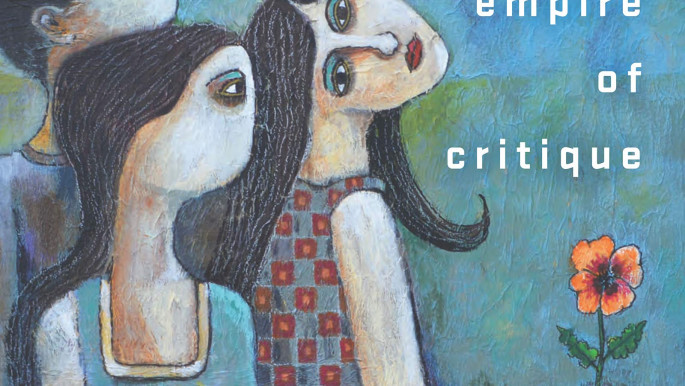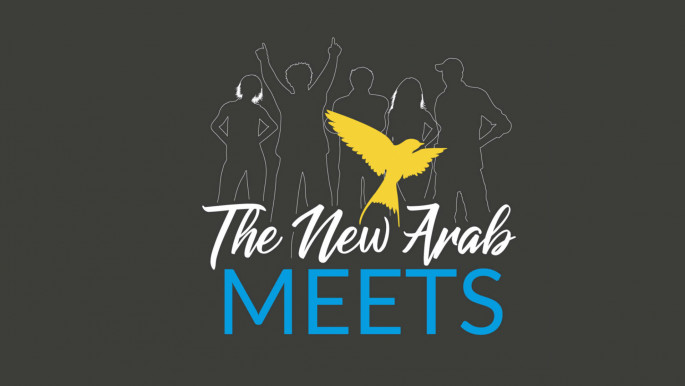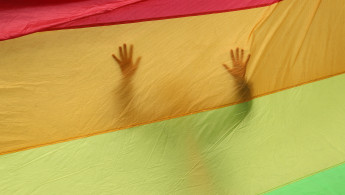Imperialism, patriarchy and the history of Palestinian LGBTQ activism
Also a human rights activist, Atshan grew up in Ramallah, Palestine, and earned his joint PhD in Anthropology and Middle East Studies from Harvard University.
Atshan's primary focus is contemporary Palestinian society and politics, global LGBTQ+ social movements, and Quaker Studies and Christian minorities in the Middle East. The New Arab met Dr. Sa'ed Atshan to discuss his new book, Queer Palestine and the Empire of Critique, which was published in May 2020 by Stanford University Press.
It is the first book of its kind to take an anthropological approach to the study of Palestine's queer community and how it has become a transnational queer movement in solidarity with all Palestinians.
Atshan also co-authored The Moral Triangle: Germans, Israelis and Palestinians (Duke University Press).
The New Arab: Congratulations on the recent publication of your book, Queer Palestine and the Empire of Critique! How did this book come to be?
Sa'ed Atshan: Thank you! This book is deeply personal for me as a gay Palestinian since I wanted to write a history of my movement, the LGBTQ Palestinian movement. I also wanted it to be a scholarly text that contributes to fields such as peace and conflict studies, anthropology, gender and sexuality studies, and Middle Eastern studies.
 |
I do not think it is possible for any human to escape politics, especially LGBTQ Palestinians. Consciousness in politics can help one navigate life and death in Palestine |  |
The New Arab: The book is an autoethnography. How does an autoethnography differ from an ethnography?
Sa'ed Atshan: It is autoethnographic in that I interweave my personal experiences throughout the text and subject myself to analytical scrutiny, just like any other research subject. Ethnography is much broader as an anthropological research methodology and approach to writing. So autoethnography is one form of ethnography, but ethnographic work does not have to be autoethnographic.
The New Arab: As an anthropologist writing an autoethnographic account of the queer community in Palestine, how much room is there to be political, especially when the everyday lives of Palestinians are so heavily impacted by politics?
Sa'ed Atshan: I do not think it is possible for any human to escape politics, especially LGBTQ Palestinians. Consciousness in politics can help one navigate life and death in Palestine. And our existence challenging both Israeli occupation and Palestinian homophobia is a political act of resistance every day, even by merely existing and surviving.
 |
|
The New Arab: What are the origins of Palestine's queer movement and is it a large community at present?
Sa'ed Atshan: The queer community in Palestine is as large as it is in any similar context, but we are unique for conflict zones in the Global South in how robust LGBTQ civil society has become. The queer movement in Palestine is at least 15 years old and was catalysed mainly by queer feminist Palestinian women.
The New Arab: In your book you dissect West/East binaries in context of Palestine's LGBTQ+ community.
Has the West dictated what it is to be queer and/or gay and have queer Palestinians adopted that model, or are they culturally unique and unaffected by Western notions of queerness?
Sa'ed Atshan: I do not think it is constructive to divide the world between East and West in simplistic ways. We can learn from each other and transnational reciprocal solidarity is possible.
The US and Europe do not have a monopoly on queerness - there are similarities with the queer Arab experience in the Middle East and there are critical differences. I have learned to see the world with more nuance as I have grown older and gained more life experiences.
The New Arab: How has life as a queer Palestinian changed over the past decade while the rest of the world embraces queerness and fights discrimination against the LGBTQ+ community? Have queer Palestinians been disjointed from the rest of the world or have they been part of this movement?
Sa'ed Atshan: Technology and social media have certainly facilitated increased openness on LGBTQ human rights among young people around the world. Palestine is in many ways closed off from the world because of the Israeli occupation, but at the same time, LGBTQ Palestinians find ways to connect with their counterparts globally. They have succeeded in making solidarity with Palestine a salient domain of allyship for queer populations around the world.
The New Arab: Would you say it is safe to be queer and/or gay in Palestine today?
Sa'ed Atshan: It really depends on one's background. Coming from a wealthy, secular, educated family in an urban setting is much easier than someone from a conservative or less privileged background. Unfortunately, it's not just Israeli occupation forces and Palestinian society that threaten queer Palestinians; the home and family can be a source of homophobic confinement, surveillance, and even psychological and physical torture.
 |
Palestinian activists have succeeded in making solidarity with Palestine a salient domain of allyship for queer populations around the world |
 |
The New Arab: What sort of pressures do the queer community in Palestine face? Does life as a queer Palestinian vary from area to area?
Sa'ed Atshan: For Palestinians living in Israel (the '48 territories) we are seeing prominent and respected figures like Ayman Odeh standing up for LGBTQ rights. It is harder in the West Bank (including East Jerusalem) where the Palestinian Authority has been terrible in cracking down on queer spaces and communities. But it is definitely the most tragic situation in the Gaza Strip for queer people because of the brutal Israeli siege as well as the terrible social suffocation imposed by Hamas.
The New Arab: What do you hope your book will achieve?
Sa'ed Atshan: One of my main goals is to help give a voice to queer Palestinians, while not speaking on behalf of everyone. I want to highlight the heterogeneity, struggles, and resilience of LGBTQ Palestinians in Palestine and in the shataat/diaspora.
Queer Palestine and the Empire of Critique is out now and can be found at Stanford University Press and on Amazon. Follow Dr. Sa'ed Atshan on Twitter @Dr_Atshan
Yousra Samir Imran is a British Egyptian writer and author who is based Yorkshire. She is the author of Hijab and Red Lipstick, being published by Hashtag Press in the UK in October 2020
Follow her on Twitter: @UNDERYOURABAYA
Read more from The New Arab Meets special section below:
 |
|



